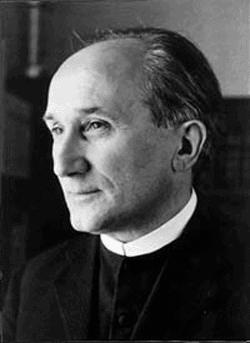
Part 1 in a series of 2
I was delighted to discover an essay in the Jesuit weekly America last November about the German Catholic theologian, Romano Guardini. When I was a student in the major seminary back in the 1950s, Guardini was my favorite spiritual writer. I can’t even guess how many of his books I read.
In my admiration of his writing, I was not alone. Guardini was one of the most popular authors among the seminarians. I recall lending out my copies of Guardini to friends. Guardini was one of those wonderful authors whose illuminating ideas seemed to leap off the page.
I seem to recall that when I read Guardini, I always had a pen in my hand so that I could underline special passages. When he was planning to write a doctoral dissertation in theology, before he was elected pope, Pope Francis was going to explore Guardini’s thought. I suspect that Guardini’s books will once again become familiar to American Catholics because Pope Francis has referred to Guardini in his writings.
Reading the essay in America was like meeting an old friend. Something of the excitement that I experienced reading Guardini more than 60 years ago returned. Once again the insights and wisdom of this great theologian were both informing and exciting me. I was especially delighted to see that Guardini’s theological vision still has much to say to us today. In fact, Guardini’s insights into both the blessings and the dangers that technology offers seem strikingly contemporary.
The title of the essay in America is “Quiet Prophet of a Distracted Age.” The author is Robert Dean Lurie. Noting what all of us have noticed about the use of cellphones and that more of us are becoming concerned about the preoccupation of many, especially the young, with technology’s latest instruments, Lurie writes the following:
“The technological changes Guardini witnessed during his lifetime (1885- 1968) were far more dramatic, jarring and violent than anything we are likely to see in our own era. Yet the deeper I go into his writings, the more convinced I become of their urgency and relevance in the here and now.
A soft-spoken, short-statured man who in his one-on-one interactions was polite and friendly to a fault, Guardini in his prose had the ability to zero in on the essence of things. His writing retained the gentleness of his personal demeanor, but it also displayed a firmness of purpose — a willingness to shake the reader from complacency.”
Lurie notes that Guardini was unique among writers who were wearied by rapid technological advancement in that he encouraged readers to embrace the present but that this should be done with intelligence. Lurie points out that Guardini’s critique and recommendation has three major components.
The first is that we must regain our interior lives that are threatened by technology. The second is that we should strive for a greater self-control. The third, which Lurie suggests might be the most difficult to achieve, is that we should reclaim our common eternal values and allow them to influence all our decisions, both the big decisions and the small decisions.
An example of a big decision would be how we raise our children; an example of a small decision would be how we interact with our technological devices.
Reading Lurie’s essay, I am amazed at how contemporary Guardini’s thought seems. Often in discussions with other professors the topic of students using cellphones arises. I have an impression, and it is only an impression, that some professors are much more lenient in allowing students to refer to cellphones during class time than I am.
For a few years, I insisted that students not refer to phones during class. Eventually I had to insist that after the opening prayer, I did not want any cellphone to be visible. A phone should not be on a desk or on a student’s lap or any place where it is visible. After the opening prayer, phones should disappear. This rule seems to be working and no student has complained to me about it.
Lurie quotes the following from Guardini’s writings:
“Human existence has advanced so far, humans have taken so big a grip of themselves, the possibilities of achievement and destruction have become so incalculable that the time has come for a new virtue, a new skill in intellectual government in which, made serious by so much experience , we can break free from entanglement in departmentalizing spheres of thinking and life..”
Guardini’s insights have motivated me to be more aware of when my use of technology is a plus and when it is not. I have a feeling that an old friend is still helping me.
Father Lauder is a philosophy professor at St. John’s University, Jamaica. He presents two 15-minute talks from his lecture series on the Catholic Novel, every Tuesday at 9 p.m. on NET-TV.
